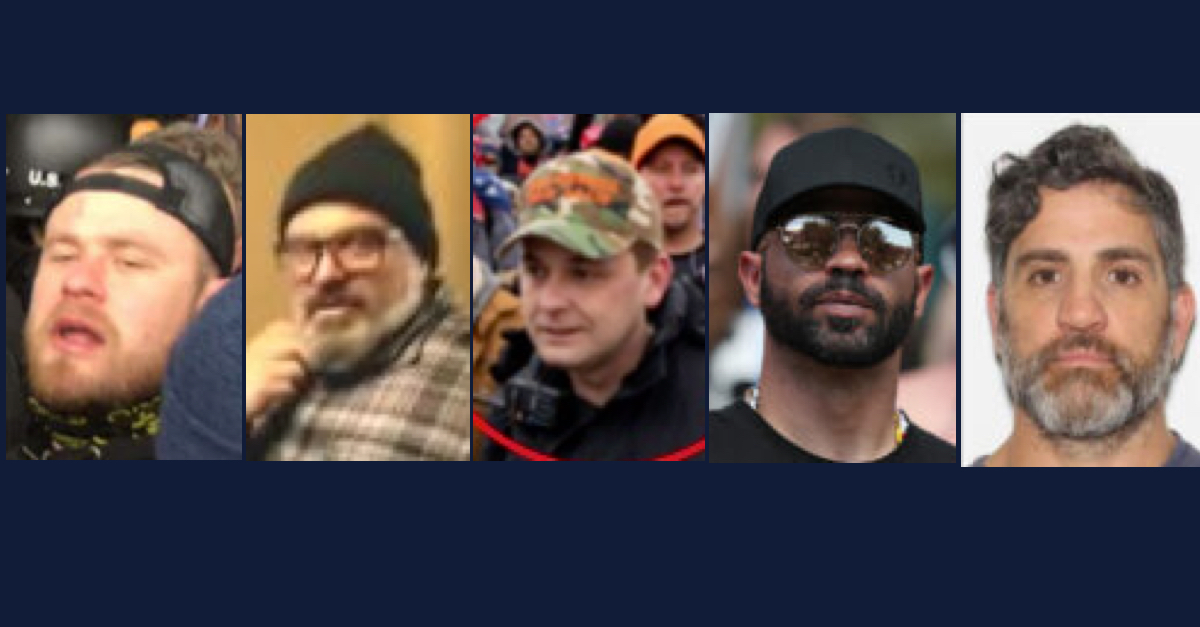
Left to right: Ethan Nordean, Joseph Biggs, Zachary Rehl, Enrique Tarrio, Dominic Pezzola, defendants in the Proud Boys Jan. 6 conspiracy case (images via FBI court filings).
Members of the Proud Boys extremist group charged with plotting to block the peaceful transition of presidential power on Jan. 6, 2021 will have to face a jury in the District of Columbia.
A federal judge rejected an 11th-hour attempt by Proud Boys leader Enrique Tarrio and co-defendants Ethan Nordean, Joseph Biggs, Zachary Rehl, and Dominic Pezzola to dismiss three counts of a superseding indictment charging them with conspiracy to obstruct an official proceeding, civil disorder, and destruction of government property.
Tarrio is accused of having created a “special chapter” of his far-right group — which describes itself as “Western chauvinists — called the “Ministry of Self Defense,” or MOSD, in order to coordinate efforts at the U.S. Capitol on Jan. 6, when Donald Trump supporters stormed the building as Congress was certifying Joe Biden’s 2020 electoral win. Their trial is set to start on Dec. 12.
The House committee investigating the Jan. 6 attack has alleged that Proud Boys members sussed out a potential security soft spot at the Peace Circle on Capitol grounds ahead of the protest march-turned-violent riot. A Jan. 5 meeting between Tarrio and Oath Keepers leader Stewart Rhodes, who is currently on trial for seditious conspiracy as well, was recorded by a documentary film crew.
In their motion to dismiss, the Proud Boys defendants argued that because the alleged “conspiratorial agreements” were formed outside of the District of Columbia, it would violate the Sixth Amendment, which requires a criminal trial to be held where the alleged crime was committed.
The defense lawyers argued that because the underlying statutes to those three particular charges lack an “overt-act element” — meaning that action was taken in furtherance of the alleged conspiracy — that D.C. is not the right place to try the case.
Not so, found U.S. District Judge Timothy Kelly, a Trump appointee.
Kelly noted that in some cases, “venue may be proper in more than one jurisdiction,” noting that “a crime is a ‘continuing offense’ if it was ‘begun in one district and completed in another, or committed in more than one district.'”
Kelly said that federal law provides that the government can prosecute such offenses in any district where the federal crime was “begun, continued, or completed,” and disagreed with the defendants’ take on the law.
“Defendants are incorrect,” Kelly wrote in a ruling issued Monday (citations omitted, emphasis added in ruling). “Conspiracies are continuing offenses, and the Supreme Court ‘has long held that venue is proper in any district in which an overt act in furtherance of the conspiracy was committed, even where an overt act is not a required element of the conspiracy offense.'”
Kelly looked to the U.S. Court of Appeals for the District of Columbia for further guidance.
“So too, the D.C. Circuit has said that ‘venue is proper in any jurisdiction where any co-conspirator committed an overt act in furtherance of the conspiracy,’ irrespective of whether the conspiracy statute contained an overt-act element,” Kelly wrote (citations omitted).
In a footnote, Judge Kelly noted that the motion to dismiss include alternative arguments in support of a previously-filed change-of-venue motion. The judge had denied that motion in a different ruling, and wrote in the footnote that the dismissal motion “offers no basis for the Court to revisit that ruling.”
Kelly also said at the start of his analysis that the motion itself wasn’t timely, having been filed on Nov. 1, after the court-ordered deadlines for motions to dismiss or change venue.
“But even if the Court were to find good cause for the delay,” Kelly wrote, “the motion lacks merit.”
Read Judge Kelly’s ruling here.
[Images via FBI court filings.]
Have a tip we should know? [email protected]